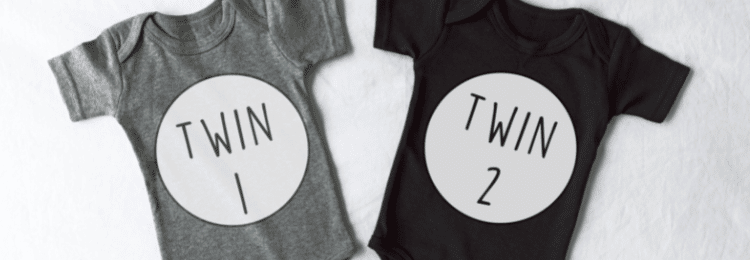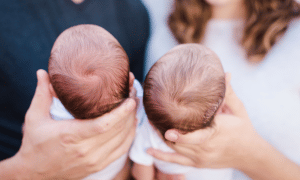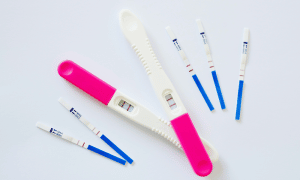Twin pregnancy symptoms at 4 weeks
There are some differences in the way you may be feeling if you’re having a singleton pregnancy or thinking it’s twin babies. Either way, it’s likely you have a positive pregnancy test so congratulations! We’ll tell you what you need to know about twin pregnancy symptoms at 4 weeks pregnant.
A pregnancy test is the most reliable way to confirm that you are pregnant. You should not rely on other signs of pregnancy such as a missed period alone.
If you believe that you’re expecting twins, you may want to know more about the potential 4 weeks pregnant symptoms you may experience.
This blog includes:
- Twin pregnancy symptoms at 4 weeks
- Early pregnancy signs with twins
- Signs of implantation with twins
- Can twins be seen at 4 weeks
- A twin pregnancy
- When are twin pregnancies more common?
- Twin births
Twin pregnancy symptoms at 4 weeks
Sometimes pregnant women may experience no pregnancy symptoms at 4 weeks. This is not uncommon and doesn’t mean there is an issue.
Many women do not even know that they are expecting a baby at 4 weeks pregnant. So, you’re one of the lucky ones that can start getting excited now!
Some of the most common of early twin pregnancy symptoms include:
- Missed period
- Feeling more tired/extreme fatigue
- Breast tenderness
- Mood swings
- Food cravings
A common difference between having one or two babies is feeling these symptoms more intensely when pregnant with twins.
However, you may still have these intense feelings with a singleton pregnancy. The only way to identify a twin pregnancy is through a professional baby scan.
In a twin or triplet pregnancy, you are likely to be invited for more ultrasound scans or even an early ultrasound. Scans help to monitor baby growth. More scans are necessary due to increased risks associated with a double pregnancy. Risk factors can include vanishing twin syndrome.
Early pregnancy signs with twins
As well as experiencing the symptoms mentioned above, you may see other signs that you’re expecting more than one baby. You may find it helpful to purchase a diary to assist you with tracking pregnancy symptoms.
Some of these symptoms may end after the first trimester. It’s likely some may continue or you’ll have new symptoms by the second trimester.
Earlier symptoms
You’ve probably already noticed pregnancy hormones. This can cause pregnancy symptoms to start earlier. Being 4 weeks pregnant is likely the first chance you will experience pregnancy-like symptoms.
For most women, pregnancy symptoms are often similar to premenstrual symptoms such as breast tenderness. Spotting the early signs of a twin pregnancy is even more difficult if this is your first pregnancy.
Pay close attention to your pregnancy test
When you take a pregnancy test, you are relying on your body having higher human chorionic gonadotropin levels (HCG hormone). This is a pregnancy hormone that only forms during this time, therefore it is an accurate measure.
Your body begins to produce HCG around 6 days after fertilisation occurs. This adds to the reliability of a home pregnancy test at 4 weeks.
When waiting for a positive pregnancy test, you may find that the line is darker and appears faster. This could be an indication of elevated HCG levels which may be a sign of twin pregnancy.
While this sign may make sense, it’s still not possible to confirm twins until you have a professional ultrasound scan.
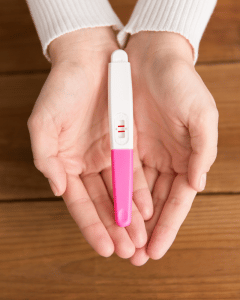
What’s that smell?
You may have already experienced this one and be wondering what’s going on. In pregnancy, it’s not uncommon to start smelling strange smells or even disliking smells you previously liked.
Some women also report having strange metallic tastes in their mouths. This is definitely a symptom that you may find more intense with twins rather than just one baby.
Hot Hot Hot!
Feeling a little warm and don’t think it’s because of the weather? When having a twin pregnancy, you may find that you feel warmer. This is also a symptom of pregnancy with one baby but can often cause sweating and breathlessness when carrying twins.
If you’re feeling warmer, take a break and try to relax. When pregnant, more heat can lead to extreme exhaustion, which can make you feel under the weather.
Frequent urination at 4 weeks pregnant
Feel like you can’t stop going to the loo? At 4 weeks pregnant, implantation is likely occurring. The extra pressure on your uterine wall could be making you feel like you need the toilet more than usual.
While you may not have a bump at 4 weeks pregnant, you may be experiencing some bloating. You may also find you’re experiencing extra weight gain. This can add to the pressure of needing to go to the toilet more often.
Morning sickness at 4 weeks pregnant
You’re probably wondering: when does morning sickness start? Morning sickness at 4 weeks is not uncommon. For many women, sickness doesn’t start until week 6.
Some women may experience severe morning sickness, which could be a sign of hyperemesis gravidarum. It’s important to be seen by a doctor if you’re struggling to keep food and drinks down for 24 hours.
Other signs can include losing weight, reduced urination and dizziness.
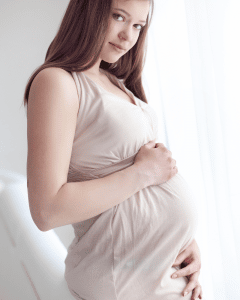
Signs of implantation with twins
Spotting at 4 weeks pregnant is often nothing to worry about, and can be a sign of implantation beginning. This is known as implantation bleeding. It occurs as the embryo attaches itself to the uterine wall.
In the same way, you may experience some mild cramping at 4 weeks pregnant. It is very important that if you feel any more serious pains, you seek advice from a healthcare provider. Even if you are carrying one baby, seek advice.
Can twins be seen at 4 weeks
After the first few weeks of pregnancy, your babies are currently the size of poppy seeds. So it’s very unlikely that you would be able to see them. Having an ultrasound at 4 weeks pregnant may allow you to see the yolk sac and gestational sacs.
You may also see a white dot or two, which might well be your twins. Due to the scan being so early in pregnancy, you’ll have to wait for confirmation that you’re pregnant with twins.
Confirmation of multiple pregnancy will usually occur at a 12 week scan. You might find out what kind of placenta you have, which will tell you what type of twins you have.
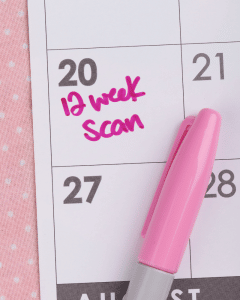
A twin pregnancy
With a twin pregnancy, there are two types you can have.
Fraternal twins
Fraternal twins are often described as non-identical twins. Being non-identical means that you may have two babies of the same sex or different. While this type of twin may look similar, they will not share ‘identical’ features.
This type of twin is formed when two separate eggs are fertilised using different sperm cells. This means that the babies implant separately in the womb. They are also unlikely to share an amniotic sac or placenta.
Identical twins
Identical twins occur in one-third of twin pregnancies. They form from one fertilised egg which means they share the same genes, that’s why they have identical features.
This form of twins is always the same sex. So you’ll either have identical twin girls or boys. They will usually share a sac of amniotic fluid and a placenta in the womb.
When are twin pregnancies more common?
There are some instances where non-identical twin pregnancies are more common; these include:
- Some ethnic groups
- Being over the age of 35
- IVF treatment
Being over the age of 35 can mean that you’re more likely to release more than one egg during ovulation. Similarly, with IVF fertility treatments, more than one embryo may be passed on.
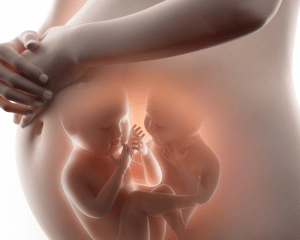
Twin births
In a twin pregnancy, you will likely be invited for a planned birth. This is because being pregnant with two or more babies presents a higher risk of premature birth. A planned birth allows the healthcare professionals to plan the labour and help you through it.
For twin babies, planned births are most likely to occur between weeks 32 and 37 of pregnancy. If you choose to decline the planned birth, you will have more regular scans. More monitoring is necessary due to the extra risks of prolonging a twin pregnancy.
Remember that if you believe you are pregnant, a pregnancy test should be completed for an accurate response.
An early pregnancy sign we have mentioned above may not mean you are pregnant with twins. While you may be getting excited at the thought of having twins, you should wait for a scan for confirmation. We hope you enjoy your first trimester!
Hey there, I’m Abigail!
In 2022, I graduated with a First Class Degree in Marketing and since then, I have been working as a blogger and Marketing Assistant. Before heading to university, I also achieved a BTEC in Children’s Play, Learning and Development.
I have been blogging for over four years and have covered many topics during this time. My focus has been on pregnancy, babies, sleep and baby name ideas.
I am passionate about learning new things and helping others. I hope that you find my blogs useful and informative. See you in the next article!



